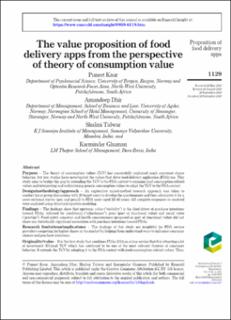| dc.contributor.author | Kaur, Puneet | |
| dc.contributor.author | Dhir, Amandeep | |
| dc.contributor.author | Talwar, Shalini | |
| dc.contributor.author | Ghuman, Karminder | |
| dc.date.accessioned | 2022-03-03T11:48:20Z | |
| dc.date.available | 2022-03-03T11:48:20Z | |
| dc.date.created | 2022-02-02T15:31:37Z | |
| dc.date.issued | 2021 | |
| dc.identifier.issn | 0959-6119 | |
| dc.identifier.uri | https://hdl.handle.net/11250/2982788 | |
| dc.description.abstract | Purpose
The theory of consumption values (TCV) has successfully explained much consumer choice behavior, but few studies have investigated the values that drive food-delivery application (FDA) use. This study aims to bridge this gap by extending the TCV to the FDA context to examine food consumption-related values and interpreting and rechristening generic consumption values to adapt the TCV to the FDA context.
Design/methodology/approach
An explorative mixed-method research approach was taken to conduct focus group discussions with 20 target users to develop the questionnaire and then administer it for a cross-sectional survey (pen and pencil) to FDA users aged 22–65 years; 423 complete responses so received were analyzed using structural equation modeling.
Findings
The findings show that epistemic value (“visibility”) is the chief driver of purchase intentions toward FDAs, followed by conditional (“affordances”), price (part of functional value) and social value (“prestige”). Food-safety concerns and health consciousness (proposed as part of functional value) did not share any statistically significant association with purchase intentions toward FDAs.
Research limitations/implications
The findings of this study are insightful for FDA service providers competing for higher shares in the market by helping them understand ways to influence consumer choices and purchase intentions.
Originality/value
It is the first study that combines FDAs 2014 an online service that it is attracting a lot of investment 2014and TCV which has continued to be one of the most relevant theories of consumer behavior. It extends the TCV by adapting it to the FDA context with food-consumption-related values. Thus, it adds to the relatively scant literature on FDAs on the whole which is essential, as FDAs represent the business model of new economy, i.e. online-to-offline (O2O). Finally, this study formulates a conceptual framework that may serve as the basis of future research. | en_US |
| dc.language.iso | eng | en_US |
| dc.publisher | Emerald | en_US |
| dc.rights | Navngivelse 4.0 Internasjonal | * |
| dc.rights.uri | http://creativecommons.org/licenses/by/4.0/deed.no | * |
| dc.title | The value proposition of food delivery apps from the perspective of theory of consumption value | en_US |
| dc.type | Journal article | en_US |
| dc.type | Peer reviewed | en_US |
| dc.description.version | publishedVersion | en_US |
| dc.rights.holder | Copyright Puneet Kaur, Amandeep Dhir, Shalini Talwar and Karminder Ghuman | en_US |
| cristin.ispublished | true | |
| cristin.fulltext | original | |
| cristin.qualitycode | 1 | |
| dc.identifier.doi | 10.1108/IJCHM-05-2020-0477 | |
| dc.identifier.cristin | 1997060 | |
| dc.source.journal | International Journal of Contemporary Hospitality Management | en_US |
| dc.source.pagenumber | 1129-1159 | en_US |
| dc.identifier.citation | International Journal of Contemporary Hospitality Management. 2021, 33 (4), 1129-1159. | en_US |
| dc.source.volume | 33 | en_US |
| dc.source.issue | 4 | en_US |

